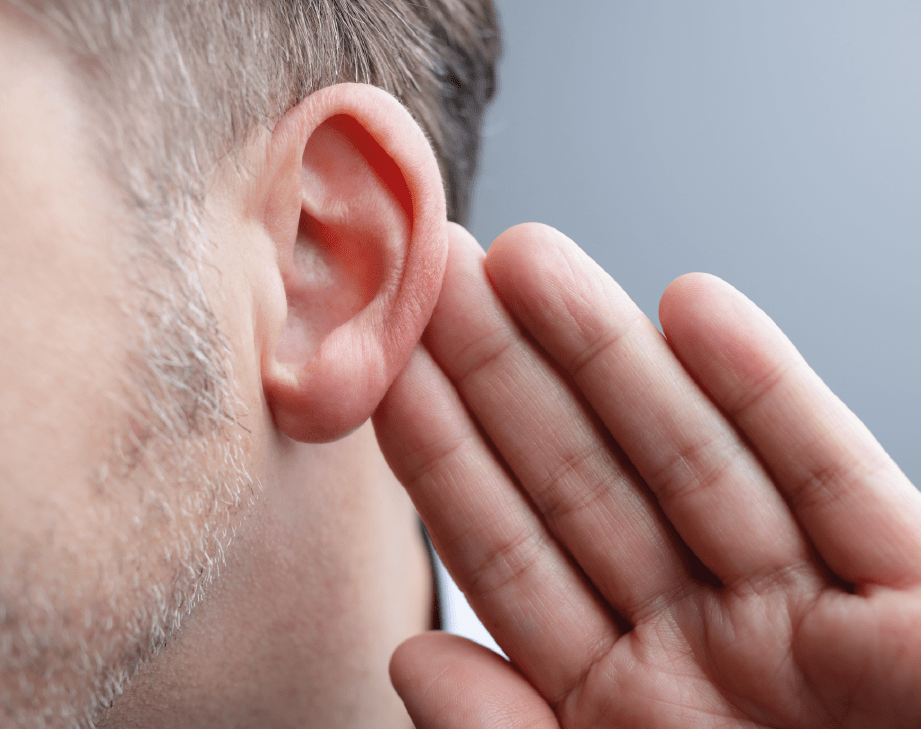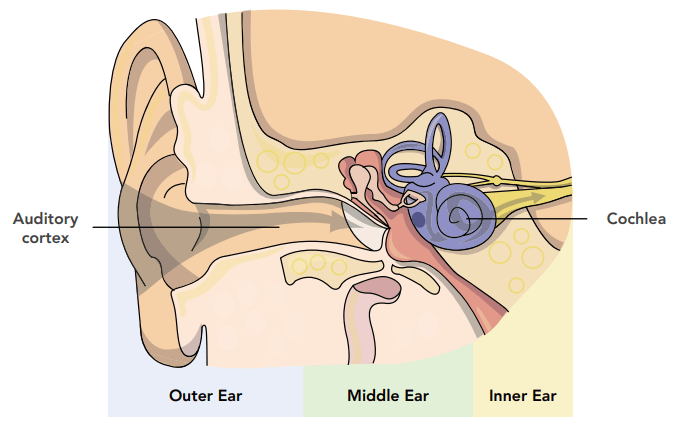

Employee Fact Sheet: Hearing Loss
Introduction
Hearing loss is the partial or complete loss of the ability to hear sound in one or both ears. It can be a temporary or permanent process, typically coming on gradually as we age, (although it can at times also occur suddenly). It can affect both children and adults: some people are born deaf, whereas adults tend to lose their hearing over time through the ageing process.
Hearing loss represents a serious health burden and can have a significant negative impact on relationships, social interaction, employment and educational opportunities, as well as on people’s quality of life and mental health. In the UK, more than 40% of people over 50 years old report hearing loss, rising to more than 70% of people over the age of 70.
Moreover, our ability to hear is a fundamental part of our day-today life with implications for our ability to work and communicate with others. An awareness of how to look after our ears and hearing is therefore particularly important for our overall wellbeing.
How hearing works
The ear consists of three parts: the outer, middle and inner ear. The outer ear (the part of the ear you can see) is shaped to focus sound waves into the ear canal so that these can reach the ear drum. Normally, these sound waves reach the outer ear and are conducted down through the ear canal to the eardrum, causing it to vibrate.
These vibrations are transmitted by the 3 tiny ear bones (ossicles) of the middle ear to the fluid inside the cochlea, a coiled tube full of fluid and tiny hair cells inside the inner ear. This fluid then causes movement of the hair cells within the ear, which creates electrical impulses that are sent via the auditory nerve to the brain.
These impulses travel to the brainstem and the midbrain, before reaching the auditory cortex in the temporal lobe where it is converted into sound.
Hearing loss can result from problems at any point along this pathway. Usually however, hearing loss is the result of prolonged exposure to loud noises, resulting in damage to the hair cells which then do not grow back.
Diagram: how hearing works

Causes of hearing loss
Hearing loss can present in a number of ways, occurring either gradually or suddenly, and affecting either one or both ears.
For example, hearing loss due to ageing or prolonged exposure to loud noises tends to occur as a gradual hearing loss affecting both sides. This is due to the fact that as we age, we lose some of the hair cells in the inner ear that sense sound.
Gradual hearing loss affecting only one ear on the other hand tends to result from problems within the ear, like ear wax, an accumulation of skin cells (cholesteatoma), a build-up of fluid (a glue ear) or a bony outgrowth (otosclerosis). An acoustic neuroma (a non-cancerous, slow growing tumour that grows on a nerve within the hearing pathway) can also be a rare cause of hearing loss affecting only one side.
Sudden hearing loss may also affect either one or both ears. Sudden hearing loss on one side for example may be due to a build-up of ear wax, infections of the outer or middle ear, a burst (perforated) ear drum or Meniere’s disease (a condition affecting the inner ear).
Sudden hearing loss affecting both sides tend to result from damage sustained from a very loud noise, or from taking certain medications that can have a negative impact on hearing.
In addition to these causes, hearing loss can also be triggered by a number of other issues, ranging from genetic factors to viral infections such as meningitis, measles, mumps, chickenpox and rubella.
It is important therefore that if you have any concerns regarding your hearing that you explore these further with your GP, particularly if you notice a sudden change in your hearing over a few days, as you may require treatment or further investigation for this.
Hearing loss can also be triggered by a number of other issues, ranging from genetic factors to viral infections such as meningitis, measles, mumps, chickenpox and rubella.
Signs and symptoms of hearing loss
It can sometimes be unclear whether you are suffering from hearing loss, and the symptoms you notice may depend on your age and the underlying cause. Signs may also vary if only one ear is affected.
These include:
- difficulty hearing other people clearly or misunderstanding what they say, especially in noisy environments
- feeling that people are mumbling and having to often ask them to repeat themselves
- your ear feeling blocked or muffled, or as if it is full of water or pressure
- listening to music or watch television at high volume
- making a real effort to hear what other people are saying
- having ear pain
- noticing tinnitus, a ringing or buzzing of the ear
- having headaches
- noticing fluid leaking from your ear
- a feeling of dizziness, as if the world were spinning around you (known as vertigo).
Treatment/Prevention
Our ability to treat hearing loss depends on its underlying cause. Hearing loss can sometimes simply improve by itself, or can be treated with medication or a simple procedure (e.g. earwax can be softened with ear drops and removed).
Unfortunately however, some types of hearing loss (such as the gradual change associated with the ageing process) can be permanent. In this instance, treatment can help to improve a patient’s hearing using hearing aids, implants (devices attached to the skull or implanted deep inside the ear) or by training in sign language or lip reading.
Whilst it isn’t always possible to prevent all hearing problems, there are some simple and easy steps that can be taken to protect against permanent hearing loss, a lot of which involve managing exposure to loud noise.
Noise remains the single biggest cause of permanent hearing loss. Hearing loss due to loud sounds, such as you’d experience at a music concert, tends to be temporary but can become permanent over time with recurrent exposure. Permanent damage is more likely if your ears do not have time to recover afterwards.
- A noise is probably loud enough to cause hearing problems if:
- You notice that you can’t hear what people near you are saying.
- You have to raise your voice to talk to others.
- If you notice muffled hearing or ringing in your ears afterwards.
Noise levels are measured in decibels (dB), with higher values representing louder noise. As a rule of thumb, any noise louder than 85dB could potentially be harmful, especially if you’re exposed to it for a prolonged period of time. An example of kind of this level would be listening to music on full volume through headphones.
In essence, the louder the sound, the less time you should spend exposed to it. For example, listening to sounds at 80dB for more than 40 hours in a single week increases your risk of hearing loss. At 90dB, that damage starts after only 4 hours a week, and listening to those same sounds at 100dB can cause damage after just a few minutes a week.
Lower your risk of hearing loss
Avoid exposure to loud noises, and where you are exposed to loud noises, protect your ears where you can. Avoid standing near speakers in nightclubs and bars and consider buying earplugs or headphones that are specially designed for listening to music. These aim to reduce volume rather than muffling sound.
At home, it can help to avoid keeping your television, radio or music on too high a volume. At work, if your workplace is noisy or has loud equipment, be sure to wear ear protection, and try to switch to quieter equipment if possible.
As further guidance on this front, the World Health Organisation (WHO) has recommended that young people limit exposure to loud sounds and the use of personal music players to an hour a day to limit exposure to noise.
In addition to noise avoidance, it is also important to bear in mind that you should avoid inserting things into your ears, whether they be fingers, cotton buds or tissues, as this can cause further damage.
If you are concerned about your hearing, it can also be helpful to arrange a hearing test (an audiogram) with your GP, as the sooner this is identified, the sooner it can be investigated and managed. If you work in a high-risk environment with lots of loud noises, you may also benefit from regular hearing checks on a yearly basis, to monitor how your hearing is doing.
Finally, take advantage of apps that measure your background noise levels or from smart headphone/ smart phone software.
In summary:
- Hearing loss can occur for a number of reasons but has the potential to have an outsized impact on our wellbeing and ability to work and interact with others.
- It typically occurs over time due to a combination of the ageing process and exposure to loud noise, but can occur for a variety of reasons.
- It isn’t always easy to be sure if you are suffering from hearing loss, so please book an appointment with your GP to explore this should you have concerns.
- Prevention is better than cure: an awareness and management of your exposure to loud noise can help you with maintaining your hearing health.



